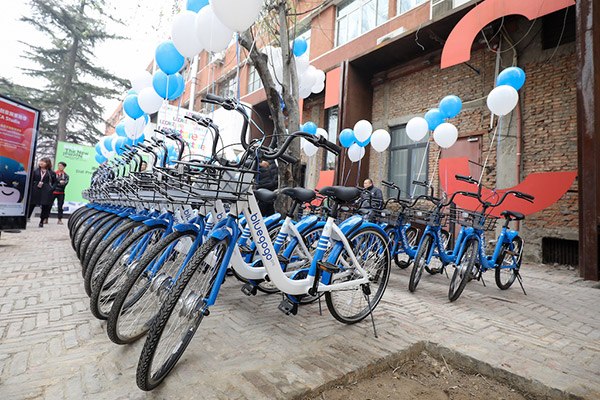
New model of Mobike unveiled by bike-sharing startup Mobike Inc. (Photo provided to China Daily)
Chinese bike-sharing companies are using new technologies to better balance supply and demand for commuters, in a bid to gain the knockout advantage in the booming bike-sharing market.
Beijing Mobike Technology Co Ltd, one of the leading bike-sharing companies, on Thursday unveiled a new feature that allows customers to locate and choose bikes that offer digital red envelopes, a move it said would help dispatch bikes to where demand is high, such as subway stations.
Based on its intelligent positioning functions and big data analysis, Mobike will link red envelopes to bikes that sit idle and then guide users to ride those bikes to locations where demand is high, said Yang Yujie, Mobike product director.
After scanning the QR code of the selected bikes, users will enjoy a free ride for up to 2 hours, as well as receiving an electronic red envelope with a value ranging from 1 yuan (15 cents) to 100 yuan after a 10-minute ride, said Xia Yiping, co-founder and CTO of Mobike.
Xia said when red packets accumulate to more than 10 yuan, users can withdraw the money via Alipay, the e-wallet run by Ant Financial Services Group.
The new services would operate in Beijing, Shijiazhuang in Hebei province and Jinan in Shandong province from Thursday, and then will spread to other cities.
Mobike has deployed more than 1 million bikes in 34 cities, including 33 Chinese cities and Singapore.
Zhang Xu, an analyst at Beijing-based consultancy Analysys, said the new move could help Mobike build on its strengths to compete in the fierce market.
"It will definitely call for users to engage in dispatching bikes. And the red envelopes will also improve users' experiences and attract more people to use the services," Zhang said.

On Wednesday, Bluegogo International Inc, another bike-sharing operator, unveiled a real-time monitoring system of road traffic and a new model of lightweight bicycles.
Bluegogo General Manager Wan Yao said the system could keep it updated on real-time vehicle positions, so they are able to dispatch the bikes in advance to meet users' growing demand.


















































